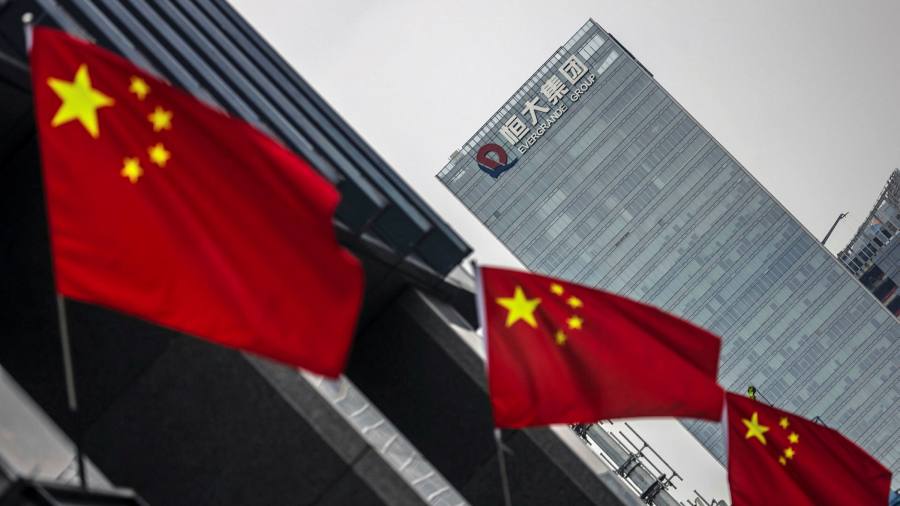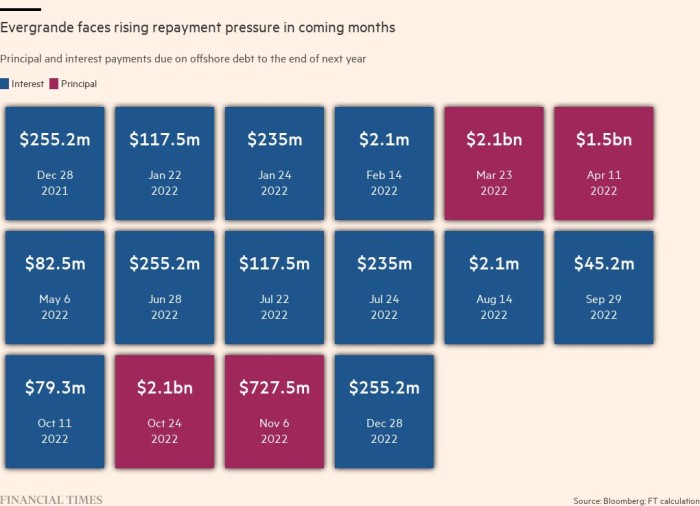
Probe into Evergrande’s links to regional bank poses new threat
China’s top banking regulator is set to complete an investigation into the relationship between Evergrande and a little-known Chinese regional bank, which could pose a new threat to the world’s most indebted property group and its billionaire founder Hui Ka Yan.
Chinese media reported in May that the China Banking and Insurance Regulatory Commission (CBIRC), the country’s top banking regulator, was examining more than Rmb100bn ($15.6bn) of transactions involving the Shenzhen-headquartered developer and Shengjing Bank, a Hong Kong-listed lender it part-owned. The probe is nearing its final stages, according to two people familiar with the matter.
The regulator scrutinised how the bank became exposed to Evergrande’s debts and Hui’s role in the corporate relationship, the people added. Chinese media has reported that the regulator has focused on transactions involving Evergrande and Shengjing, in which the developer owned a significant stake.
One person familiar with the investigation said there appeared to have been potential regulatory violations by both Shengjing and Evergrande over the threshold of allowable debts owed by a single borrower.
Repeated phone calls to Shengjing Bank and emails seeking comment have not been answered.
Evergrande did not respond to a request for comment about the company or Hui.
The probe by China’s banking authority covers a period of significant upheaval for Evergrande, which has become engulfed in a liquidity crisis that has shaken global markets. The developer’s struggles have also cast doubts over the health of the broader property sector, which underpins China’s economic growth model.
The regulator’s effort has taken on greater significance as Beijing confronts what would be one of the biggest debt restructurings in Chinese history, with Evergrande’s total liabilities exceeding $300bn.

The developer announced the $1.5bn sale of a 20 per cent stake in Shengjing Bank in late September to a finance group owned by local authorities in the north-eastern city of Shenyang. The deal was part of Evergrande’s rush to sell assets days after missing a big interest payment on an offshore bond.
Evergrande said at the time that the stake sale was to free up capital and address the “adverse effects” of its liquidity issues on the bank.
But it added in the same regulatory filing that Shengjing had demanded that net proceeds be used to repay liabilities Evergrande owed the bank, raising questions about whether the developer had relied on a business it partly owned for financing.
China Lianhe Credit Rating, a Beijing-based rating agency, said in a July report that Shengjing Bank had “broken through regulatory restrictions and requires continuous attention”, and added it had a “high degree of risk exposure to anonymous customers”.
Among the problems the report cited were loans that Shengjing Bank had extended to “related party borrowers”, which potentially included shareholders. It did not name the borrowers.
Evergrande’s sale of part of its Shengjing stake has also caught the attention of an international bondholder group. Advisers to the bondholders told them last month that the use of proceeds to repay another lender could amount to “preferential treatment” at a time when it was unclear whether they would be paid or not.
Evergrande narrowly avoided default by transferring funds in late October before a grace period ended, but faces another such deadline today.
Prices of Evergrande’s bonds have lost most of their value since the initial reports of the probe. The developer has faced a number of subsequent setbacks, including project delays and missed bond payments, that have underlined the vulnerability of the sector.
Other Chinese developers including Sinic, Fantasia and China Modern Land have defaulted on bond payments. Property company Kaisa, a big borrower on international bond markets, pleaded for “patience” this week as it sought to raise cash from asset sales.
Hui, formerly China’s richest man, has pursued asset sales in a bid to raise cash and avoid an official default. But the Shengjing Bank divestment was the only significant deal completed in recent months.
The purchase of the stake by state investors also represented the clearest sign of government involvement at a time when Beijing’s exact role in determining Evergrande’s future has been unclear.
In some previous cases, concerns over the links between individuals, companies and banks have led to state action. Baoshang Bank was taken over by the government in 2019 after it collapsed followed excessive lending to companies controlled by Tomorrow Group, a financial and investment conglomerate led by billionaire financier Xiao Jianhua, who also held a large stake in the bank. Xiao disappeared after being abducted by Chinese security agents from a suite in Hong Kong in 2017.
Shen Meng, director at Chanson & Co, a Beijing-based boutique investment bank, warned that some Chinese banks that had become controlled by private companies appeared to have been forced into issuing large loans to their private shareholders.
For Chinese companies facing high demands for liquidity, especially private real estate developers, taking a stake in a commercial bank had become an important “flexible” solution, he said.
But such partnerships posed a “hidden danger”, Shen added, allowing shareholders to leverage low-cost credit for huge expansions, or, when facing a tightening business environment, to use the bank to expand credit.
The CBIRC issued new measures to tighten oversight of banks’ controlling shareholders in June.
However, Alicia García Herrero, chief economist for Asia-Pacific at French investment bank Natixis, said banking regulators could have moved faster after the collapse of Baoshang to order equity holders of smaller lenders — a prominent cause of the related party risks — to divest.
“The lesson wasn’t fully learned . . . it seems it was not done,” she said.
Reporting by Sherry Fei Ju in Beijing, Sun Yu in Shanghai, Primrose Riordan and Thomas Hale in Hong Kong and Edward White in Seoul
Stay connected with us on social media platform for instant update click here to join our Twitter, & Facebook
We are now on Telegram. Click here to join our channel (@TechiUpdate) and stay updated with the latest Technology headlines.
For all the latest Education News Click Here
For the latest news and updates, follow us on Google News.

